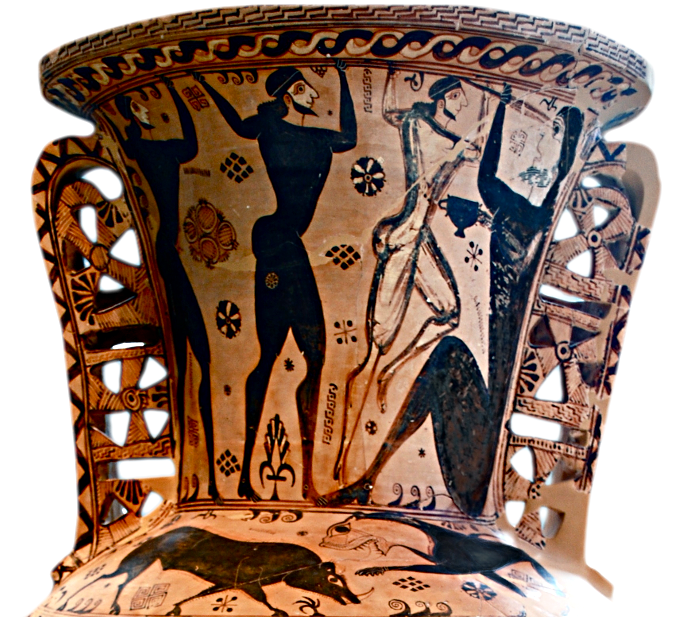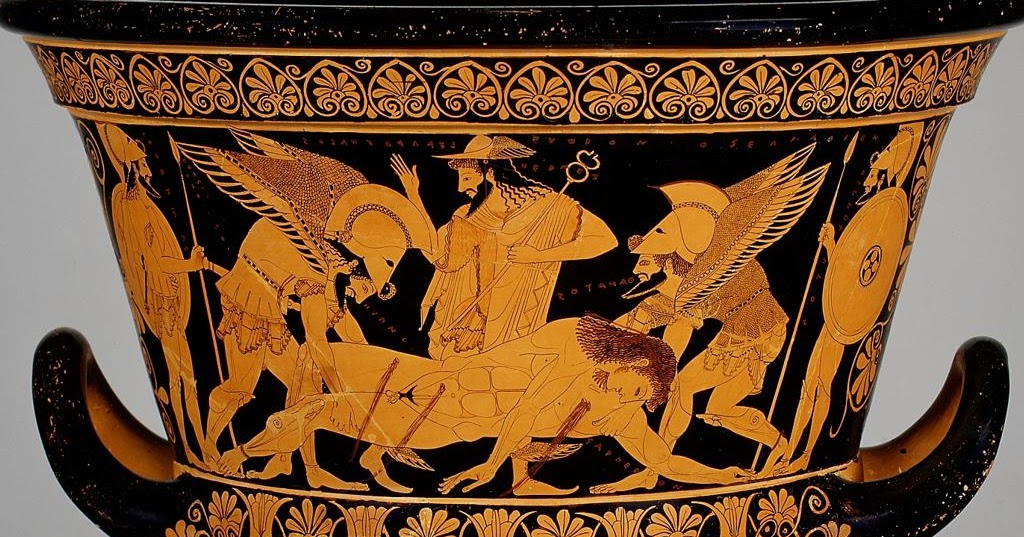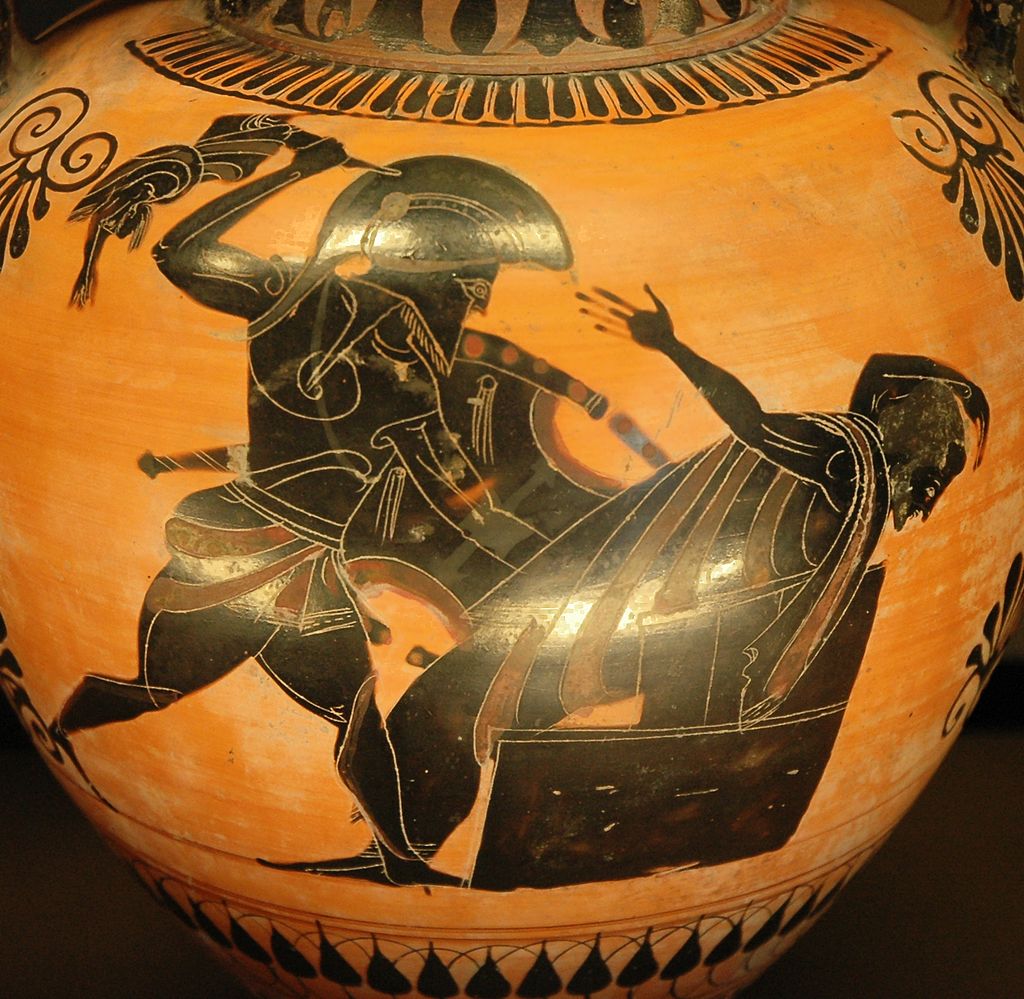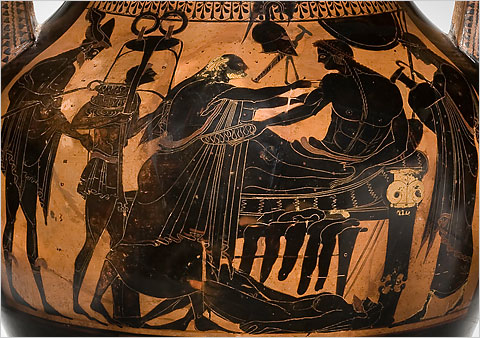CLAS 353
August 23, 2023

Odysseus & Polyphemus, proto-Attic amphora, 650 BCE
Homer, Odyssey 1.1ff. (trs. S. Lombardo) [story of Odysseus' homecoming = nostos; postwar reconstruction of identity, community, culture on the island of Ithaka]
SPEAK, MEMORY—
Of the cunning hero,
The wanderer, blown off course time and again
After he plundered Troy’s sacred heights.
Speak
Of all the cities he saw, the minds he grasped,
The suffering deep in his heart at sea
As he struggled to survive and bring his men home
But could not save them, hard as he tried—
The fools—destroyed by their own recklessness
When they ate the oxen of Hyperion the Sun,
And that god snuffed out their day of return.
Of these things,
Speak, Immortal One,
And tell the tale once more in our time.
Homer, Iliad 1: Briseis' "cheeks flushed . . . she went unwillingly" (1.359-60; Book 24?)
[Books 2-15: Achilles keeps vow not to fight until Trojans reach Greek ships; ebb & flow of battle; Trojans pressing Greek camp & ships at beginning of Iliad 16]

Death of Sarpedon, red-figure vase, ca. 510 BCE (Iliad 16.709ff.)
- heroic code: Lycian Sarpedon to Glaucus on aristocratic privileges & responsibilities of Homeric warriors; glory (kleos), honor, mortality:
Iliad 12.315-28
Well, now we have to take our stand at the front,
Where all the best fight, and face the heat of battle,
So that many an armored Lycian will say,
'So they're not inglorious after all,
Our Lycian lords who eat fat sheep
And drink the sweetest wine. No,
They're strong, and fight with our best.'
Ah, my friend, if you and I could only
Get out of this war alive and then
Be immortal and ageless all of our days,
I would never again fight among the foremost
Or send you into battle where men win glory.
But, as it is, death is everywhere
In more shapes than we can count,
And since no mortal is immune or can escape,
Let's go forward, either to give glory
To another man, or get glory from him.
- Achilles' pre-war choice (Thetis,"And now I will never / Welcome him home again to Peleus' house", 18.62-3; if he kills Hector?); independence in Iliad 1 as exceptional individual struggling within community (status, honor (timê) > compensation for his choice); + hero of god-like insight (Book 24)?
GROUPS (Iliad 16, 18)
[Iliad 19-21:
Achilles' revenge & aristeia ("display of excellence"), Greeks counter Trojan attack & advance on Troy]
- Achilles v. Hector, duel around walls of Troy (Iliad 22)
Iliad 22.7-10 (omniscient narrator)
In the dead air between the Greeks
And Troy's Western Gate, Destiny
Had Hector pinned, waiting for death.

Neoptolemus Kills Priam, black-figure vase, 520-510 BCE (cf. Aeneid 2)
- Priam's unpersuasive speech to Hector (22.45ff.): "Show some pity for me . . . one day some Greek soldier will stick me / With cold bronze and draw the life from my limbs . . ."
- Hector's final plea to Achilles: "I beg you, Achilles, by your own soul / And by your parents, do not / Allow the dogs to mutilate my body . . ." (375-6); ransom offer & Achilles' reply?
- Hector's dying words: "And I will have my vengeance on that day / When Paris and Apollo destroy you / In the long shadow of Troy's Western Gate" (398-400)
- Greeks retreat, mourn Patroclus, mutilate Hector's body
[Iliad 23: funeral games for Patroclus]
- Achilles continues to defile Hector's body in Iliad 24

Ransom of Hector, black-figure vase, 520-510 BCE
- Priam visits Achilles at Greek camp: Achilles' insights & acceptance of shared human experience (mortality, loss, suffering, compensation, etc.?)
Iliad 24.544-51 (following Priam's appeal)
He spoke, and sorrow for his own father
Welled up in Achilles. He took Priam's hand
And gently pushed the old man away.
The two of them remembered. Priam,
Huddled in grief
at Achilles' feet, cried
And moaned softly for his man-slaying Hector.
And Achilles cried for his father and
Patroclus. The sound filled the room.
- shared grief, meal; Achilles accepts ransom & cleanses body, truce for Trojan mourning, Priam's departure
- Hector's funeral: laments of Trojan women (Andromache, Hecuba, Helen) & Priam, fractured community joined in ritual, "That was the funeral of Hector, breaker of horses" (24.860)




